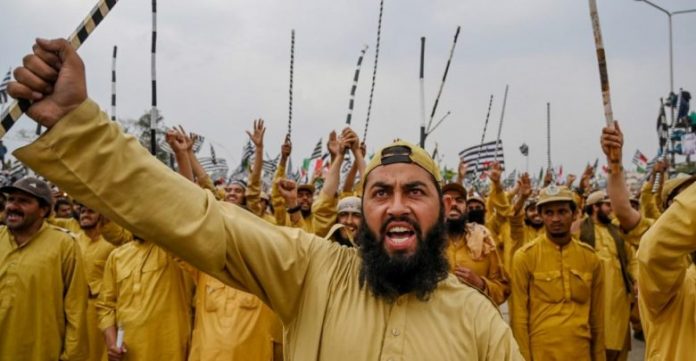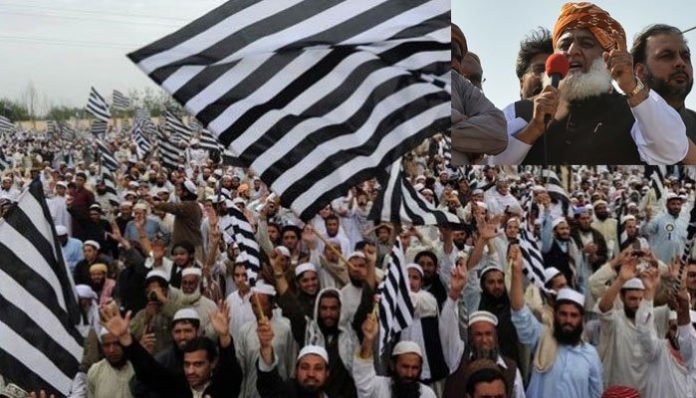As this goes into print Maulana Fazlur Rahman and supporters had reached Islamabad. Luckily GOP showed maturity by not stopping them enroute, hopefully in reciprocity the assembled protestors, though fired up considerably demanding Imran Khan’s political demise, will continue keeping the peace (and hygiene) in Islamabad. The so-called “Azadi March” took off from Karachi’s Sohrab Goth, a Pashtun settlement at the fringes of the city. Despite efforts of a negotiating team of the government this could not be prevented. The Azadi March leaders are not marching to prove that the PTI government has failed, but are afraid that this government is succeeding! The Maulana is demanding nothing less than PM Imran Khan’s resignation alleging that he had come to power through “selective” elections. Is he alleging that the Election Commission of Pakistan is just a rubber stamp? What he means by the slogan ‘Azadi’ is also not really clear.
The new government had inherited a desolate economy robbed by the previous governments, the unfortunate march of the Maulana comes at a time when it is showing first signs of stabilization. Though these signs are still not easily visible for the common man because still prices are rising and all the other odds are more or less in place. But after about 15 months in power one cannot realistically expect to right the wrongs that have been there for years if not decades. The beginnings of change are there and while there is a bumpy road in front of us, there is light at the end of the tunnel. Everybody who has some knowledge about economy and economic policies and who cares for Pakistan can see that.
That is not the case with Fazlur Rahman and his lot. He keeps frightening the government with videos about his danda-swinging yellow army trying to get his way. Even the meeting with COAS Bajwa who must have read him the riot act to him did not help. One reason for this could be the tacit support of the opposition parties PPP and PML(N), the leaders of whom are sitting in jail or in court facing multiple cases of corruption. Neither of the two parties is in a good shape and ready for action. The latest drama has been Fazl of all people accusing the PM of a ‘pro-Modi stance’ and a double-edged Kashmir policy while he himself with the timing of his march at this point is detracting the attention from the Kashmir issue and therefore, damaging it. His performance as head of the Kashmir Committee under the last government has done nothing to further the Kashmir cause. And as far as his Indian relation is concerned there is a conspicuous photograph showing Fazlur Rahman sitting cosily together with Ajit Doval, the Indian security adviser, the man given the task of destroying Pakistan. Sitting in a glass house, Fazl, one should not throw stones!
Fazlur Rahman’s Party JUI(F) is one of the several religious parties of Pakistan that have never in the history of this country been able to make a big impression in national elections and until today has a meagre political clout. Fazlur Rahman himself only secured a seat from his home town Dera Ismail Khan when he teamed up with other, secular parties. In 1980 at the age of 27 he had inherited the leadership of JUI party from his father Mufti Mahmood in another example of kingship. The party is based on Deobandi ideology that strives for an Islamic state and, therefore, has a strained attitude towards democracy and elections. He tried to square the circle by taking part in elections and teaming up with secular parties for that and, on the other hand, support the Taliban who at least partly students of madrassahs run by his party.
In 1981 the JUI joined the MRD to pressure Zia to hold free elections. Though the JUI won six seats in the National Assembly in the 1990 elections the Maulana could not win his seat in DI Khan. In the 1993 national elections, the JUI was the main component of the Islami Jamhoori Mahaz, which won four seats in the National Assembly, one for the Maulana. He then made connections with Afghan Taliban many of whom were educated in the madrassahs in the tribal areas and he is probably much of a father of the Pakistani Taliban as well. JUI(F) has widespread support in KP, FATA and Baluchistan Province. Indeed, it is considered Pakistan’s only political party that has a rather stabile organizational structure in the former tribal areas. Much of the party’s support derives from the militants connected to northwest Pakistan’s network of madrasahs.

The change came in 2007 when leaked U.S. State Department cables revealed that the JUI-F leader purportedly wanted to mediate between the United States and the Afghan Taliban. After this disclosure, Afghan Taliban militants and the al-Qaida leadership reportedly decided to sever links with the JUI-F. Since then members of the JUI(F) and the Maulana himself have come under attack. Fazl has escaped unhurt from attempts on his life thrice most recently when a suicide bomber attacked a JUI-F convention in Quetta and killed several in the process. In the past years, several activists and leaders of the JUI-F have been targeted and killed in KP and FATA by unidentified Islamist militants. The latest such incident happened just days ago when JUI (F) leader Mufti Sultan Mohammad was severely injured in an assassination attempt in Tehsil Mamond, Bajaur.
Fazlur Rahman and his JUI(F) have managed to manoeuvre themselves in between two chairs: leaving their commitment to the Taliban when it became clear that TTP and militancy at large had lost the upper hand they are now trying to become useful in politics and come to the help of the beleaguered opposition parties and their leaders who are themselves unable to act. This is a dangerous move for the Maulana, he may fall in between both these chairs and land on his backside. The Taliban with their back to the wall will not forgive that Fazl has left them in the lurch and PPP and PML(N) can ill afford the company of the father of the Taliban and will turn their back on him the moment they feel stronger.
Here another question turns up. Despite this background of the party and its leader the JUI was given permission by the government to hold the march. This can be seen as a commitment to uphold the freedom of expression in our country. But what opinion is expressed by such a march of militants in a country where people are illiterate and depending for their opinion on their mullah or pir? The PM even mentioned himself that the Azadi March leaders were clueless about the reason of their protest as at one point of time they said a Jewish lobby was taking over Pakistan, then tried to attach the government with the Qadianis and at another time blamed it for price hike. The people who are carried in trucks and busses to Islamabad have no idea why they are there and probably they will receive some money for their participation or even only free meals. Internationally Pakistan’s image is rather damaged when the world sees the mullah marching at the capital. Such token expression of ‘democracy’ in a country that is ruled by a feudal landholding elite that is unable to understand the essence of democracy, namely equality of men, is a farce at best and dangerous at worst. Just remember the last blockade of Islamabad by raucous mullahs who had brought hapless people in droves there making them sit for weeks in the open thus damaging the public sphere of the capital city. With all respect for efforts to uphold ‘democracy’, isn’t this exercise in futility too expensive and dangerous in a cash-strapped country like ours? And given Maulana Fazlur Rahman’s track record, is his initiative a march for “Azadi” or “Berbadi” of Pakistan?




